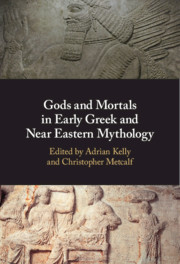Book contents
- Gods and Mortals in Early Greek and Near Eastern Mythology
- Gods and Mortals in Early Greek and Near Eastern Mythology
- Copyright page
- Contents
- Tables
- Contributors
- Acknowledgements
- Abbreviations
- Introduction
- Part I Contexts
- Part II Influence
- Part III Difference
- Chapter 11 Borrowing, Dialogue and Rejection
- Chapter 12 Divine Labour
- Chapter 13 Influence and Inheritance
- Chapter 14 Fate and Authority in Mesopotamian Literature and the Iliad
- Chapter 15 Fashioning Pandora
- Chapter 16 Sexing and Gendering the Succession Myth in Hesiod and the Ancient Near East
- Bibliography
- Index
Chapter 11 - Borrowing, Dialogue and Rejection
Intertextual Interfaces in the Late Bronze Age
from Part III - Difference
Published online by Cambridge University Press: 27 March 2021
- Gods and Mortals in Early Greek and Near Eastern Mythology
- Gods and Mortals in Early Greek and Near Eastern Mythology
- Copyright page
- Contents
- Tables
- Contributors
- Acknowledgements
- Abbreviations
- Introduction
- Part I Contexts
- Part II Influence
- Part III Difference
- Chapter 11 Borrowing, Dialogue and Rejection
- Chapter 12 Divine Labour
- Chapter 13 Influence and Inheritance
- Chapter 14 Fate and Authority in Mesopotamian Literature and the Iliad
- Chapter 15 Fashioning Pandora
- Chapter 16 Sexing and Gendering the Succession Myth in Hesiod and the Ancient Near East
- Bibliography
- Index
Summary
This chapter engages explicitly with the challenges faced by any kind of comparative analysis: while the question of historical influence remains an attractive topic for discussion, we should explore the interpretative potential of differences, as opposed to the similarities on which comparative studies tend to focus. An appreciation of differences may help us to see how one culture may be ‘receptive’ to some aspects of other tradition, while blocking others, perhaps because they are not in line with its established norms. The discussion thus examines those aspects of Anatolian and Syrian Storm Gd mythology that, unlike the central elements of the Song of Emergence, seem not to have been adopted in early Greek sources, in particular the myth of the Storm God’s conflict with the Sea, and reflects on the likely reasons that explain this apparent ‘blocking’.
- Type
- Chapter
- Information
- Gods and Mortals in Early Greek and Near Eastern Mythology , pp. 201 - 214Publisher: Cambridge University PressPrint publication year: 2021
- 1
- Cited by

